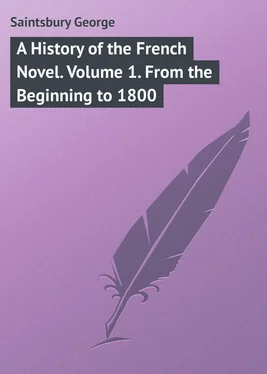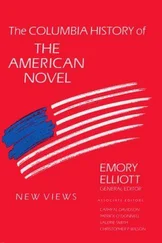George Saintsbury - A History of the French Novel. Volume 1. From the Beginning to 1800
Здесь есть возможность читать онлайн «George Saintsbury - A History of the French Novel. Volume 1. From the Beginning to 1800» — ознакомительный отрывок электронной книги совершенно бесплатно, а после прочтения отрывка купить полную версию. В некоторых случаях можно слушать аудио, скачать через торрент в формате fb2 и присутствует краткое содержание. Жанр: foreign_language, foreign_prose, на английском языке. Описание произведения, (предисловие) а так же отзывы посетителей доступны на портале библиотеки ЛибКат.
- Название:A History of the French Novel. Volume 1. From the Beginning to 1800
- Автор:
- Жанр:
- Год:неизвестен
- ISBN:нет данных
- Рейтинг книги:4 / 5. Голосов: 1
-
Избранное:Добавить в избранное
- Отзывы:
-
Ваша оценка:
- 80
- 1
- 2
- 3
- 4
- 5
A History of the French Novel. Volume 1. From the Beginning to 1800: краткое содержание, описание и аннотация
Предлагаем к чтению аннотацию, описание, краткое содержание или предисловие (зависит от того, что написал сам автор книги «A History of the French Novel. Volume 1. From the Beginning to 1800»). Если вы не нашли необходимую информацию о книге — напишите в комментариях, мы постараемся отыскать её.
A History of the French Novel. Volume 1. From the Beginning to 1800 — читать онлайн ознакомительный отрывок
Ниже представлен текст книги, разбитый по страницам. Система сохранения места последней прочитанной страницы, позволяет с удобством читать онлайн бесплатно книгу «A History of the French Novel. Volume 1. From the Beginning to 1800», без необходимости каждый раз заново искать на чём Вы остановились. Поставьте закладку, и сможете в любой момент перейти на страницу, на которой закончили чтение.
Интервал:
Закладка:
"Time was when Italy and Rome have been, to the great good of us who now live, the best breeders and bringers up of the worthiest men, not only for wise speaking, but also for well-doing in all civil affairs that ever was in the world. But now that time is gone; and though the place remain, yet the old and present manners do differ as far as black and white, as virtue and vice. Virtue once made that country mistress over all the world: vice now maketh that country slave to them that before were glad to serve it. All man [ i. e. mankind] seeth it; they themselves confess it, namely such as be best and wisest amongst them. For sin, by lust and vanity, hath and doth breed up everywhere common contempt of God's word, private contention in many families, open factions in every city; and so making themselves bond to vanity and vice at home, they are content to bear the yoke of serving strangers abroad. Italy now is not that Italy it was wont to be; and therefore now not so fit a place as some do count it for young men to fetch either wisdom or honesty from thence. For surely they will make others but bad scholars that be so ill masters to themselves."
This same characteristic, or absence of characteristic, which reaches its climax – a climax endowing it with something like substantive life and merit – in Hooker, displays itself, with more and more admixture of raciness and native peculiarity, in almost all the prose of the early Elizabethan period up to the singular escapade of Lyly, who certainly tried to write not a classical style but a style of his own. The better men, with Thomas Wilson and Ascham himself at their head, made indeed earnest protests against Latinising the vocabulary (the great fault of the contemporary French Pléiade ), but they were not quite aware how much they were under the influence of Latin in other matters. The translators, such as North, whose famous version of Plutarch after Amyot had the immortal honour of suggesting not a little of Shakespere's greatest work, had the chief excuse and temptation in doing this; but all writers did it more or less: the theologians (to whom it would no doubt have been "more easier" to write in Latin), the historians (though the little known Holinshed has broken off into a much more vernacular but also much more disorderly style), the rare geographers (of whom the chief is Richard Eden, the first English writer on America), and the rest. Of this rest the most interesting, perhaps, are the small but curious knot of critics who lead up in various ways to Sidney and Harvey, who seem to have excited considerable interest at the time, and who were not succeeded, after the early years of James, by any considerable body of critics of English till John Dryden began to write in the last third of the following century. Of these (putting out of sight Stephen Gosson, the immediate begetter of Sidney's Apology for Poetry , Campion, the chief champion of classical metres in English, and by a quaint contrast the author of some of the most charming of English songs in purely romantic style, with his adversary the poet Daniel, Meres, etc.), the chief is the author of the anonymous Art of English Poesie , published the year after the Armada, and just before the appearance of The Faërie Queene . This Art has chiefly to be compared with the Discourse of English Poetrie , published three years earlier by William Webbe. Webbe, of whom nothing is known save that he was a private tutor at one or two gentlemen's houses in Essex, exhibits that dislike and disdain of rhyme which was an offshoot of the passion for humanist studies, which was importantly represented all through the sixteenth and early seventeenth century in England, and which had Milton for its last and greatest exponent. The Art of English Poesie , which is attributed on no grounds of contemporary evidence to George Puttenham, though the book was generally reputed his in the next generation, is a much more considerable treatise, some four times the length of Webbe's, dealing with a large number of questions subsidiary to Ars Poetica , and containing no few selections of illustrative verse, many of the author's own. As far as style goes both Webbe and Puttenham fall into the rather colourless but not incorrect class already described, and are of the tribe of Ascham. Here is a sample of each: —
(Webbe's Preface to the Noble Poets of England .)"Among the innumerable sorts of English books, and infinite fardels of printed pamphlets, wherewith this country is pestered, all shops stuffed, and every study furnished; the greater part, I think, in any one kind, are such as are either mere poetical, or which tend in some respects (as either in matter or form) to poetry. Of such books, therefore, sith I have been one that have had a desire to read not the fewest, and because it is an argument which men of great learning have no leisure to handle, or at least having to do with more serious matters do least regard. If I write something, concerning what I think of our English poets, or adventure to set down my simple judgment of English poetry, I trust the learned poets will give me leave, and vouchsafe my book passage, as being for the rudeness thereof no prejudice to their noble studies, but even (as my intent is) an instar cotis to stir up some other of meet ability to bestow travail in this matter; whereby, I think, we may not only get the means which we yet want, to discern between good writers and bad, but perhaps also challenge from the rude multitude of rustical rhymers, who will be called poets, the right practice and orderly course of true poetry."
(Puttenham on Style .)"Style is a constant and continual phrase or tenour of speaking and writing, extending to the whole tale or process of the poem or history, and not properly to any piece or member of a tale; but is of words, speeches, and sentences together; a certain contrived form and quality, many times natural to the writer, many times his peculiar bye-election and art, and such as either he keepeth by skill or holdeth on by ignorance, and will not or peradventure cannot easily alter into any other. So we say that Cicero's style and Sallust's were not one, nor Cæsar's and Livy's, nor Homer's and Hesiodus', 13 13 The final s of such names often at the time appears unaltered.
nor Herodotus' and Thucydides', nor Euripides' and Aristophanes', nor Erasmus' and Budeus' styles. And because this continual course and manner of writing or speech sheweth the matter and disposition of the writer's mind more than one or two instances can show, therefore there be that have called style the image of man ( mentis character ). For man is but his mind, and as his mind is tempered and qualified, so are his speeches and language at large; and his inward conceits be the metal of his mind, and his manner of utterance the very warp and woof of his conceits, more plain or busy and intricate or otherwise affected after the rate." 14 14 i. e. "in proportion."
Contemporary with these, however, there was growing up a quite different school of English prose which showed itself on one side in the estilo culto of Lyly and the university wits of his time; on the other, in the extremely vernacular and sometimes extremely vulgar manner of the pamphleteers, who were very often the same persons. Lyly himself exhibits both styles in Euphues ; and if Pap with a Hatchet and An Almond for a Parrot are rightly attributed to him, still more in these. So also does Gabriel Harvey, Spenser's friend, a curious coxcomb who endeavoured to dissuade Spenser from continuing The Faërie Queene , devoted much time himself and strove to devote other people to the thankless task of composing English hexameters and trimeters, engaged (very much to his discomfiture) in a furious pamphlet war with Thomas Nash, and altogether presents one of the most characteristic though least favourable specimens of the Elizabethan man of letters. We may speak of him further when we come to the pamphleteers generally.
Читать дальшеИнтервал:
Закладка:
Похожие книги на «A History of the French Novel. Volume 1. From the Beginning to 1800»
Представляем Вашему вниманию похожие книги на «A History of the French Novel. Volume 1. From the Beginning to 1800» списком для выбора. Мы отобрали схожую по названию и смыслу литературу в надежде предоставить читателям больше вариантов отыскать новые, интересные, ещё непрочитанные произведения.
Обсуждение, отзывы о книге «A History of the French Novel. Volume 1. From the Beginning to 1800» и просто собственные мнения читателей. Оставьте ваши комментарии, напишите, что Вы думаете о произведении, его смысле или главных героях. Укажите что конкретно понравилось, а что нет, и почему Вы так считаете.












